This blog post is about how my 7-year old daughter and I, with help from my wife and son, set up a new 10 gallon natural planted aquarium, also known as el natural aquarium. We set it up on April 14, 2017 and made changes along the way. We added a driftwood branch from the Potomac river 3 weeks later. This aquarium uses the Walstad method and we wanted it to be as natural as possible, like a biotope.
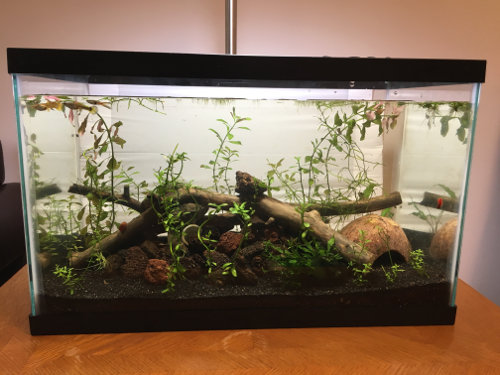 10 gallon planted tank (10 September 2017)
10 gallon planted tank (10 September 2017)
The last update was in February 2021. Jump to Updates.
Table of Contents
- Introduction
- What you need
- Before you start
- My daughter's design of the layout
- Prepare the tank, soil and sand
- Wash the sand
- Sanitize the coconut shell
- Keep the plants ready
- Add the soil and sand
- Add the lava rocks, coconut shell and PVC
- Add the plants
- Fill the tank with water
- Add snails
- Let it cycle
- Add guppies
- Add driftwood
- Disclaimer
Introduction
This is our fifth and latest natural planted aquarium. Prior to this, we have had a 20 gallon Walstad tank and a 10 gallon red cherry shrimp tank. We currently have a 2 gallon Walstad jar and a 1.5 gallon Walstad jar.
What you need
- 10 Gallon Aquarium: Petco for $10
- Substrate:
- Miracle Gro Organic Choice Potting Mix from Costco
- Black Diamond Blasting Sand (medium grade) from Tractor Supply Company
- Light: One 8W LED daylight bulb with rating 5000K or more
- Lava Rocks: Home Depot; the lava rocks here are from the old aquarium
- PVC pipes 1" and elbows: Home Depot
- Coconut: Indian store
- Plants: Low-light stem, floater plants, rhizome plants, Java moss, subwassertang
- Livestock: Guppy endler hybrids, red cherry shrimp, ramshorn and pond snails
- Air Stone: None
- Filter: No filter
- Heater: No heater
Before you start
- To speed up the cycling of the tank, we reused lava rocks from our previous tanks without letting them get dry. Lava rocks are highly porous and can house beneficial bacteria from the previous aquarium. It took about 2 weeks to cycle this tank.
- If you get plants like ludwigia repens, bacopa monnieri, anacharis, duckweed from local farms, sanitize them by giving them a H2O2 or bleach dip. Even if you get them from a store, sanitize them with H2O2.
My daughter's design of the layout
This was my daughter's design.
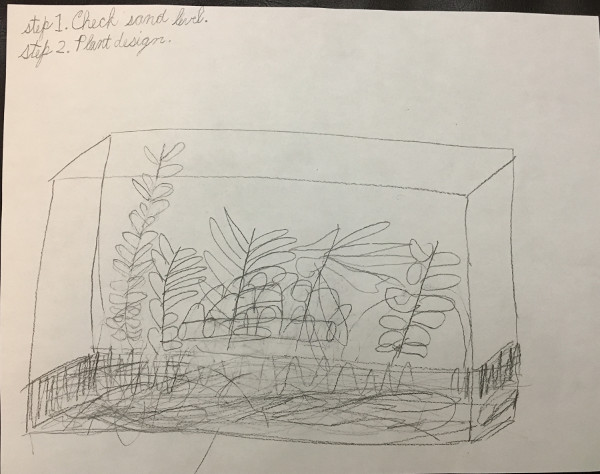
Prepare the tank, soil and sand
Quickly rinse the 10 gallon tank and make sure that it is clean. Do not clean with soap. You will put 1 to 1.5" Miracle-Gro Organic Choice Potting Mix at the bottom. You may remove the wood chunks if you want to. I did not remove the wood chunks in my jar.
Wash the sand
You'll be spreading 1.5 to 2" of black sand as cap. Wash the black sand thoroughly under running water. You'll find that even with 3 or 4 rinses, it maybe be a little oily.
Sanitize the coconut shell
Break the coconut and drink the coconut water. Cut the shell into two parts and carve an entrance on the bigger part. Pull out as much of the fiber as you can. Boil it for 20 to 30 minutes. You'll see the tannins coming out and the water turning to brown.
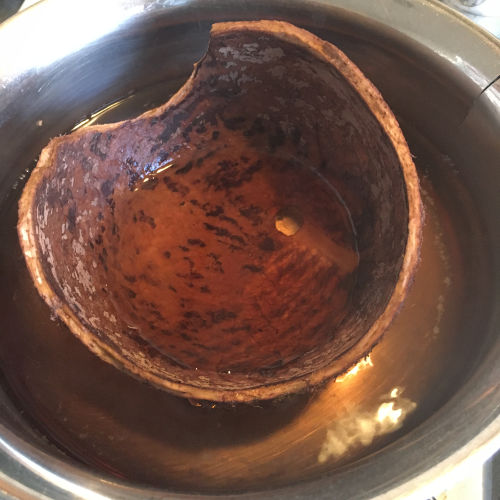
Rinse the coconut shell and keep it ready to go to the tank.
Keep the plants ready
I had a bunch of plants from my previous planted tanks. This was the plant list:
- Floating plants: Amazon Frogbit, Duckweed
- Rooted plants: Ludwigia Repens, Bacopa Monnieri(moneywort), Rotala Rotundafolia, Crypt Wendtii
- Rhizome plants: Java Windelov Fern
- Others: Java moss, Subwassertang, Guppy Grass (Najas)
Add the soil and sand
Add 1.5" Miracle Gro Organic potting mix. Press the soil gently so that it lets out the air. Then, add 1.5" black sand. You can create sloping effects for aesthetic purposes.
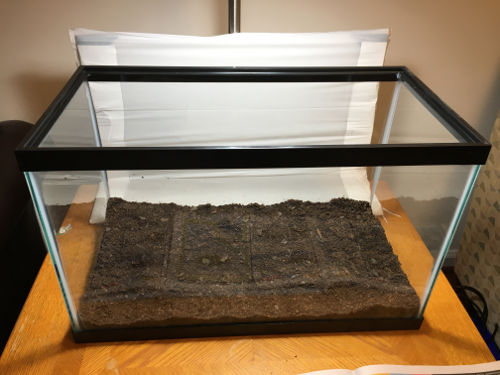
Add the lava rocks, coconut shell and PVC
Add lava rocks to the middle towards the back. Connect the PVC pipes with elbows on the ends and place them under the lava rocks. The PVC pipes will be used for the cherry shrimp and guppy fry to hide in. The coconut shell will be used by the shrimp and fry to hide. I'm also trying to grow Java moss on the surface of the coconut shell.
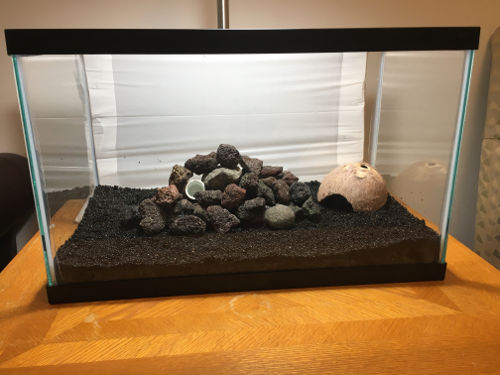
Add the plants
Add the plants according to your aquascape design. Keep the stem plants and crypt in the back and middle. The Java fern windelov is attached to a rock and stays in the foreground.
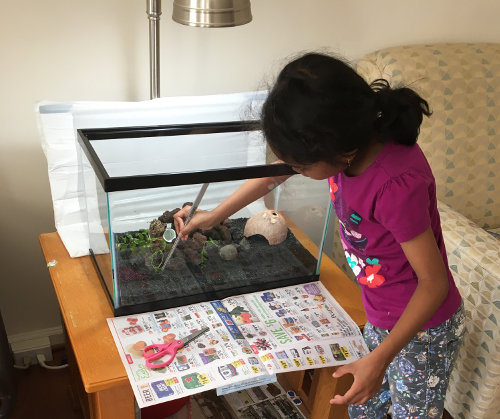
Fill the tank with water
After planting everything, slowly fill the aquarium with water. If the water disturbs the sand or soil and you see it kicking up, do not worry. It usually takes overnight for the water to clear.
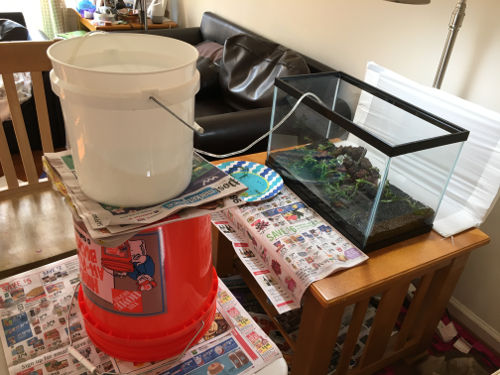
Add snails
Add a few pond and ramshorn snails. They are good for eating the decomposing leaves and other things. I didn't have any Malaysian trumpet snails for this tank, but they do a good job in aerating the substrate.
Let it cycle
Throw in a few fish flakes and let the cycling start. You can also add a piece of dead shrimp as an ammonia source. I've done fishless and fish-in cycle before and really don't see a difference between the two. After a couple of days, change 20% of the water. At some point, the water will get clouded. That's normal. Just do a water change.
Add guppies
After 2 weeks, I added guppy juveniles to this 10 gallon aquarium.
Add driftwood
Soon after setting up this tank, we found this large driftwood in a creek. We bought it home and sawed it into 3 parts. To sanitize it, we placed it in a tinfoil contained and poured boiling water over it. We used an old toothbrush to brush away the filth and algae buildup on the driftwood.
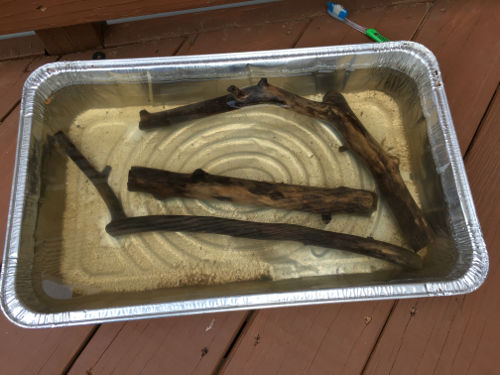 Add plants
Add plants
After soaking it for two weeks, we added the driftwood to the tank.
 10 gallon planted tank (10 September 2017)
10 gallon planted tank (10 September 2017)
Disclaimer
Your results may vary. I used lava rocks from an existing planted tank, so my tank cycled sooner.
Updates
- 9 September 2017: We made DIY guppy flakes using duckweed and flour. The guppies seemed to like it a lot.
- February 2021: We moved to a new house in early 2021. I sold this 10g tank and bought a new 10g tank and started a blue diamond shrimp tank.
Related Posts
If you have any questions, please contact me at arulbOsutkNiqlzziyties@gNqmaizl.bkcom. You can also post questions in our Facebook group. Thank you.